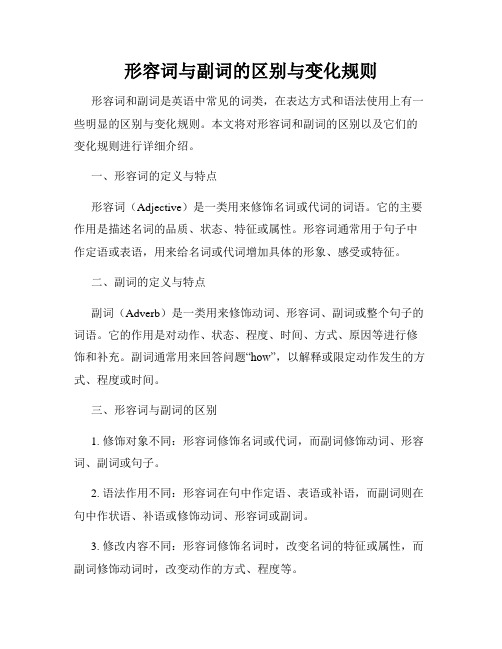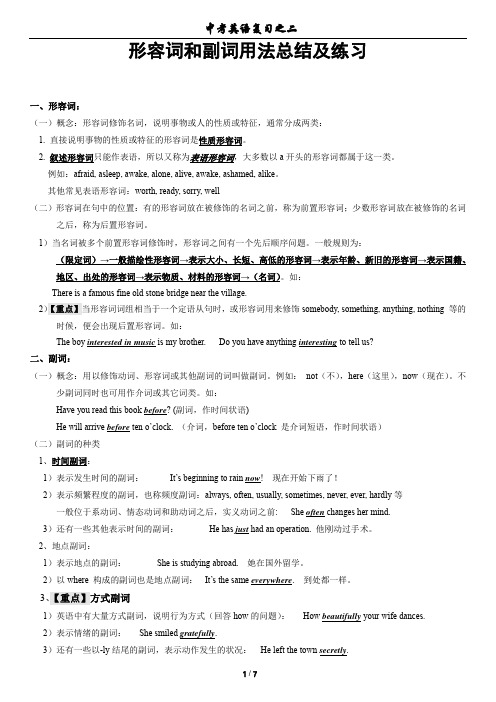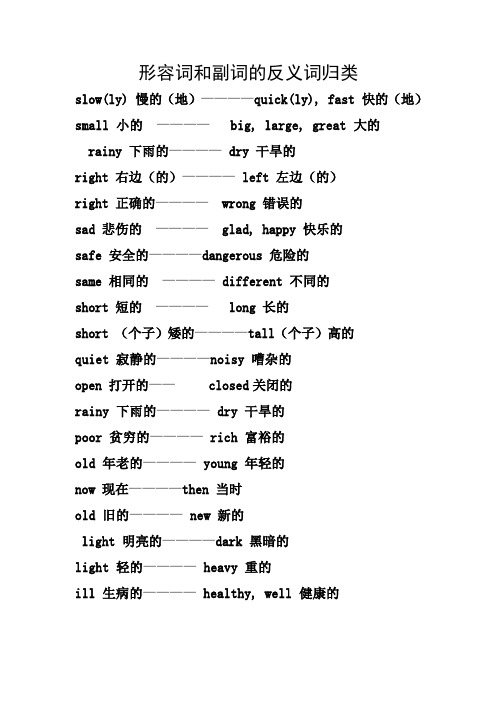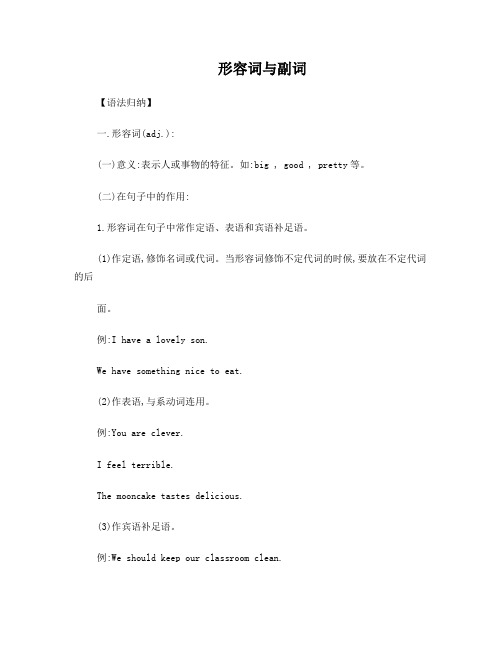形容词和副词(305)
形容词和副词

Good —— well
好
好地(当表示身体好时,是形容词)
四、功能
口诀:形名、副动、系形
1、形容词修饰名词,作定语,放前面。A prettruns quickly. 3、系动词+形容词
系动词
五、常考形容词
1、enough 足够两面派: Enough+名词 见到名词跑前面 enough money 形/副+enough 见到形/副躲后面 rich money 2、 alone独自的/地 live alone
( 3 ) too….to 太…而不能 too+形容词+to+动词原形 She is too fat to walk.
七、比较级 1、标志词
than(比….)
两者相比较
2、比较级的类型
递增比较:A+动词+比较级+than+B 递减比较:A+动词+less+原形+than+B 同级比较:(肯定)A+动词+as +原形+as+B
Hainan is a most beautiful city.
九、比较级、最高级的变化规则(单、双、多、特)
单音节:1、一般情况下+er/est. Fast-faster/fastest 2、以不发e结尾,+r/st. Nice-nicer/ nicest
双音节:3、以辅音字母+y结尾,将y变i+er / est. pretty-prettier/ prettiest, easy-easier. 4、以辅元辅且重读结尾,双写尾字母+er / est. hot-hotter / hottest, fat-fatter / fattest
形容词与副词的区别与变化规则

形容词与副词的区别与变化规则形容词和副词是英语中常见的词类,在表达方式和语法使用上有一些明显的区别与变化规则。
本文将对形容词和副词的区别以及它们的变化规则进行详细介绍。
一、形容词的定义与特点形容词(Adjective)是一类用来修饰名词或代词的词语。
它的主要作用是描述名词的品质、状态、特征或属性。
形容词通常用于句子中作定语或表语,用来给名词或代词增加具体的形象、感受或特征。
二、副词的定义与特点副词(Adverb)是一类用来修饰动词、形容词、副词或整个句子的词语。
它的作用是对动作、状态、程度、时间、方式、原因等进行修饰和补充。
副词通常用来回答问题“how”,以解释或限定动作发生的方式、程度或时间。
三、形容词与副词的区别1. 修饰对象不同:形容词修饰名词或代词,而副词修饰动词、形容词、副词或句子。
2. 语法作用不同:形容词在句中作定语、表语或补语,而副词则在句中作状语、补语或修饰动词、形容词或副词。
3. 修改内容不同:形容词修饰名词时,改变名词的特征或属性,而副词修饰动词时,改变动作的方式、程度等。
四、形容词的变化规则1. 基本形式:形容词的基本形式一般是原级(原形),如“big”。
2. 比较级(比较形式):形容词在比较级中加“-er”,如“bigger”。
在一些特殊情况下,形容词的比较级会发生规则变化,如“good”变为“better”、“bad”变为“worse”等。
3. 最高级(最高形式):形容词在最高级中加“-est”,如“biggest”。
同样地,一些形容词在最高级中会有规则变化,如“best”、“worst”。
五、副词的变化规则1. 基本形式:大多数副词的基本形式与形容词相同,只是作用不同,如“loud”(形容词)和“loudly”(副词)。
2. 比较级和最高级:大多数副词的比较级和最高级都是在前面加“more”和“most”,如“more slowly”、“most beautifully”。
高中英语形容词和副词(高频汇总)

高中英语形容词和副词(高频汇总)-CAL-FENGHAI.-(YICAI)-Company One1高考英语高频形容词和副词1.immediate adj立即的,即刻的;立刻的,马上2.clear adj 清楚的,清晰的3.cautious adj小心翼翼的4.vivid adj 生动的,逼真的5.exactly adv1.确切地,精确地;完全地 2.恰好地,正好地6.fortunately adv.幸运地3. (用于答语)完全正确。
(的确这样)7.surprisingly adv令人惊讶的 8.hardly adv 几乎不9.instead adv代替,相反 10. properly adv 适当地;正确地;恰当地11. specially adv专门 12.reliable adj 可靠的,可信赖的13.simply adv 简单地;仅仅,只不过 ly adv即,也就是15.not nearly = far from = nowhere near远非,远远不,一点也不 16.patient adj耐心的;n 病人17.plain adj简单的,朴素的 18.familiar adj熟悉的;19.lucky adj 幸运的 20.amazing adj令人惊异的,21.accidentally adv 1. 偶然地;意外地 2. 附带地 22.silent adj沉默的23.calm adj平静的 24.secret adj 秘密的25.otherwise adv 否则 26.meanwhile adv期间,同时27.besides adv除…..以外还有 28.efficient adj高效的,有效的29. flexible adj 灵活的 plex adj复杂的awkward adj 尴尬的,笨拙的 clumsy complicated adj 难懂的,复杂的31.smooth adj平稳的,光滑的,顺利的 32.regularly adv 定期的,有规律的33.sensitive adj 敏感的,体贴的 34.honest adj诚实的35.confident adj自信的 36.shy adj .1.害羞的,腼腆2.羞涩的37.thoughtful adj 1. 深思的,沉思的 2. 富有思想的;经认真推敲的38.lighthearted and optimistic adj无忧无虑而且非常乐观39.nevertheless adj然而 40.private adj私人的(private cars)41.personal adj个人的(personal belongings) 42.unique adj唯一的,独一无二的;独特的43.favorable adj赞同的,有利的 44.precious adj 宝贵的,珍贵的 previous45.essential adj必要的,重要的 46.worthwhile adj 值得的47.physical adj体力的,物理的 48.sudden adj 突然的49.merely adv仅仅,只 only 50.rarely adv 罕见的51.splendidly adj 极好地,灿烂地 wonderful 52.increasingly adv 越来越多地53.naturally adv自然地 54.accurate adj精确的,准确的55.ridiculous adj可笑的,荒谬的 56.urgent adj紧急的,急迫的57.shallow adj浅的,肤浅的 58.frequently adv经常地,频繁地59.especially adv特别地,尤其地 particularly 60.obviously adv显而易见 apparent 61.necessarily adv必要地,必须地,必然地 62.generally adv一般地,通常地63.eventually adv最终,最后 64.adoptable adv可采用的,可收养的65.acceptable adj可以接受的 66.available (adj)可利用的,可使用的,可得到的67.accessible adj易接近的,易受影响的,可理解的 68.relatively adv 相对地,比较地69.approximately adv大约 70.absolutely adv绝对正确,71.punctual adj守时的 72.gentle adj温柔的73.neatly adv整洁地 74.entirely adv完全地75.highly adv高度地,非常地 76.strongly adv强烈地,坚固地77.extremely adv极端地,非常 78.reasonably adv合乎情理地79.eagerly adv热切地;渴望地 80.badly adv很,非常81.slightly adv稍微,轻微地 82.equally adv平等地tely adv最近,近来 84.enthusiastic adj热情的;热烈的;热心的85.energetic adj精力充沛的,有活力的 86.talkative adj 1. 喜欢说话的87.impressive adj 影象深刻的 2. 多嘴的 3. 健谈的88.traditional adj 传统的 89.practical adj 1. 实践的,实际的90.similar adj 类似的,相似的 91.convenient adj 方便的,便利的92.sooner or later 迟早,早晚, 93.more or less 或多或少,差不多,几乎94.once in a while 偶尔,时而不时 95.now and then 偶尔,有时96. willingly adv情愿地 97. unexpectedly adv 出乎意料地unwillingly adv 不情愿地 98. unforgettable adj不易忘记的99.doubtful adj. 可疑的;令人生疑的;疑心的;不能确定的100. hardly / scarcely adv几乎不100. respectable adj 值得尊敬的respectful 102 distinguished adj著名的;卓著的;高贵的For personal use only in study and research; not for commercial use.Nur für den persönlichen für Studien, Forschung, zu kommerziellen Zwecken verwendet werden. Pour l 'étude et la recherche uniquement à des fins personnelles; pas à des fins commerciales.толькодля людей, которые используются для обучения, исследований и не должны использоваться в коммерческих целях.以下无正文For personal use only in study and research; not for commercial use.Nur für den persönlichen für Studien, Forschung, zu kommerziellen Zwecken verwendet werden. Pour l 'étude et la recherche uniquement à des fins personnelles; pas à des fins commerciales.толькодля людей, которые используются для обучения, исследований и не должны использоваться в коммерческих целях.以下无正文。
中考英语形容词和副词用法总结

形容词和副词用法总结及练习一、形容词:(一)概念:形容词修饰名词,说明事物或人的性质或特征,通常分成两类:1. 直接说明事物的性质或特征的形容词是性质形容词。
2. 叙述形容词只能作表语,所以又称为表语形容词,大多数以a开头的形容词都属于这一类。
例如:afraid, asleep, awake, alone, alive, awake, ashamed, alike。
其他常见表语形容词:worth, ready, sorry, well(二)形容词在句中的位置:有的形容词放在被修饰的名词之前,称为前置形容词;少数形容词放在被修饰的名词之后,称为后置形容词。
1)当名词被多个前置形容词修饰时,形容词之间有一个先后顺序问题。
一般规则为:(限定词)→一般描绘性形容词→表示大小、长短、高低的形容词→表示年龄、新旧的形容词→表示国籍、地区、出处的形容词→表示物质、材料的形容词→(名词)。
如:There is a famous fine old stone bridge near the village.2)【重点】当形容词词组相当于一个定语从句时,或形容词用来修饰somebody, something, anything, nothing 等的时候,便会出现后置形容词。
如:The boy interested in music is my brother. Do you have anything interesting to tell us?二、副词:(一)概念:用以修饰动词、形容词或其他副词的词叫做副词。
例如:not(不),here(这里),now(现在)。
不少副词同时也可用作介词或其它词类。
如:Have you read this book before? (副词,作时间状语)He will arrive before ten o’clock. (介词,before ten o’clock 是介词短语,作时间状语)(二)副词的种类1、时间副词:1)表示发生时间的副词:It’s beginning to rain now! 现在开始下雨了!2)表示频繁程度的副词,也称频度副词:always, often, usually, sometimes, never, ever, hardly等一般位于系动词、情态动词和助动词之后,实义动词之前: She often changes her mind.3)还有一些其他表示时间的副词:He has just had an operation. 他刚动过手术。
形容词 和副词 反义词归类

形容词和副词的反义词归类slow(ly) 慢的(地)————quick(ly), fast 快的(地)small 小的———— big, large, great 大的rainy 下雨的———— dry 干旱的right 右边(的)———— left 左边(的)right 正确的———— wrong 错误的sad 悲伤的———— glad, happy 快乐的safe 安全的————dangerous 危险的same 相同的———— different 不同的short 短的———— long 长的short (个子)矮的————tall(个子)高的quiet 寂静的————noisy 嘈杂的open 打开的—— closed关闭的rainy 下雨的———— dry 干旱的poor 贫穷的———— rich 富裕的old 年老的———— young 年轻的now 现在————then 当时old 旧的———— new 新的light 明亮的————dark 黑暗的light 轻的———— heavy 重的ill 生病的———— healthy, well 健康的high 高的———— low 低的happy‖glad愉快的——unhappy sad, sorry 悲伤的难过的good 好的————bad, ill, poor 坏的;恶劣的great 伟大的————little, small 渺小的happy 高兴的———— unhappy, sad 难过的difficult‖hard 艰难的———— easy 容易的hard 硬的————soft 软的first 最初的———— last 最后的foreign 外国的———— home 本国的far 远的———— near 近的sunny‖fine 晴朗的——cloudy, rainy 天阴的;下雨的empty 空的———— full 满的dry 干燥的————wet 潮湿的early 早的————late 迟的easy 容易的————difficult,‖ hard 困难的;艰巨的dead 死的————alive, ‖living 活的cool 凉爽的————warm 温暖的danger 危险————safety 安全dark 黑暗的————bright,‖ light ‖明亮的clean 干净的————dirty 肮脏的clever 聪明的————foolish 愚蠢的cloudy 天阴的————bright‖clear‖sunny 晴朗的cold 寒冷的————hot 炎热的busy 【忙碌的】————free 【空闲的】certainly 【当然地】——perhaps, maybe 【或许;大概】cheap 【便宜的】————expensive, dear 【昂贵的】best 【最好的】———— worst 【最坏的】better 【更好的】————worse 【更坏的】big 【大的】————small, little 【小的】black 【黑的】————white 【白的】bad 【坏的】————————good 【好的】badly 【恶劣地】————well 【很好地】more 更多的———— less, fewer 更少的most 最多的———— least, fewest 最少的boring 无聊的————interesting 有趣的ugly丑陋的———beautiful美丽的,漂亮的curly卷曲的———straight垂直的thin瘦的———fat胖的free空闲的———busy忙的comfortable舒适的———uncomfortable不舒适的。
形容词与副词的用法

形容词与副词的用法形容词(Adjective)和副词(Adverb)是英语中常见的词性,它们在句子中扮演着重要的角色。
形容词用来修饰名词,描述名词的性质或特征,而副词则用来修饰动词、形容词、副词等,并给出更详细的说明。
本文将从不同的角度探讨这两个词性在句子中的用法。
1. 形容词的用法形容词常用于以下几种情况:(1) 修饰名词形容词可以修饰名词,起到描述名词特征的作用。
例如:- 美丽的花朵在花园中怒放。
- 这个小男孩很聪明。
(2) 构成比较级和最高级形容词可以用来表示比较级和最高级。
在比较级中,我们通常在形容词后加上-er,而在最高级中加上-est,或者在形容词前加上more和most。
例如:- 这本书比那本书更有趣。
- 这是我见过的最美丽的风景。
(3) 作表语形容词可以用作表语,与主语连系动词一起说明主语的特征或状态。
例如:- 这个问题很困难。
- 我很高兴。
2. 副词的用法副词常用于以下几种情况:(1) 修饰动词副词可以修饰动词,表示动作的方式、程度等。
例如:- 他慢慢地走过了街道。
- 她轻轻地打开了门。
(2) 修饰形容词和副词副词也可以修饰形容词和副词,表示程度或者方式。
例如:- 这个女孩非常漂亮。
- 他们跑得很快。
(3) 修饰整个句子副词有时可以修饰整个句子,表示说话人的态度、观点或推测。
例如:- 显然,他是个天才。
- 或许,我们会成功。
总结:形容词和副词在英语句子中的用法多种多样,灵活运用它们可以使句子更加生动、精确。
形容词用来修饰名词,描述名词的性质或特征;而副词则用来修饰动词、形容词、副词等,并给出更详细的说明。
在写作中,我们应该注意正确使用形容词和副词,使句子表达更加准确、丰富。
形容词与副词

形容词与副词【语法归纳】一.形容词(adj.):(一)意义:表示人或事物的特征。
如:big , good , pretty等。
(二)在句子中的作用:1.形容词在句子中常作定语、表语和宾语补足语。
(1)作定语,修饰名词或代词。
当形容词修饰不定代词的时候,要放在不定代词的后面。
例:I have a lovely son.We have something nice to eat.(2)作表语,与系动词连用。
例:You are clever.I feel terrible.The mooncake tastes delicious.(3)作宾语补足语。
例:We should keep our classroom clean.2.特殊的形容词:(1)ill和well表示身体健康的时候,只能作表语,不作定语。
例:The boy was ill .不能说:He was an ill boy.The girl looks very well.不能说:She is a well girl.(2)以ly结尾的形容词,不要认为是副词。
如:friendly, lonely , lively二.副词(adv.)(一)意义:(修饰动词、形容词或其他副词)表示时间、地点、方法或程度等。
如:very , quite , slowly等。
(二)种类:1. 时间副词:now, then, ago , tomorrow2. 地点副词:here, there, outside, everywhere3. 方式副词:slowly, happily, angrily4.程度副词:almost, hardly, nearly5.疑问副词:how, why, where, when6.频度副词:always, often , usually(三)副词在句子中的位置:一般情况下,时间副词和地点副词的位置通常在句末,二者同时出现时,先地点后时间。
完整word版形容词和副词的比较级和最高级

一、形容词和副词的概念形容词:是修饰名词(人或事物),表示名词的性质,特征或属性一种词类。
它在句中作定语、表语和宾语补足语。
词叫副词。
副词在句中多作副词:用来修饰动词.形容词及其他副词的状语.二、形容词和副词的用法的名词之前。
①形容词作定语一般放在被修饰big treesa new book, two。
如:等②形容词放在系动词be , get, turn, become, keep, stay, look, smell, feel, taste, sound, 等之后。
如:1. I am short・2・She looks fine・3・ They turn green.③如果形容词修饰不定代词something,anything, everything, nothing等时,要放在不定代词后面。
如:something interesting nothing new④副词放在所修饰的动词之后、形容词和副词之前。
如果前面是行为动词,则后面用副词。
如:1. She works hard・(修饰动词)2.I am very busy.(修饰形容词)3.He runs too quickly ・(修饰副词)4.We play happily.(修饰动词)⑤通常在形容词后加-ly变成副词。
slow —►____ real t ___________usual —> _____ careful—> _______easy —______ happy—> ________heavy —> ____ angi^y—* _______形容词副词比较级最高级变化形式归纳大多数形容词和副词有比较级和最高级的变化,即原级、比较级和最高级,用来表示事物的等级差别。
原级即形容词的原形,比较级和最高级有规则变化和不规则变化两种。
规则变化1 •单音节以及少数双音节的词后面直接加-er或-est最高级比较级原级tallest taller tallsmartest smarter smartshortestshorter shortesto结尾的双音节形容词末尾加特别提醒:以-y, -er, -ow, leer和healthy, funny, busy, hungry, easy, happy, early, pretty, lazy,如:heavy, dirty, clever, narrow o -stp或2.以不发音的e结尾只加最高级原级比较级nicest nice nicerfinest fine finerlargestlarge larger-est或i,再加-er3•“以辅音字母+y”结尾的词改y为最高比较原easiesteasiereasyprettiestprettierprettyhappiesthappierhappyfunniestfunnierfunnybusiestbusierbusy再加以一个元音加一个辅音字母结尾的重读闭音节词,双写后面的辅音字母,4 •一est最高级原级比较级thinnest thin thinner hottest hotter hotbiggestbigger big等词含有字母组合,且发的是长元音,不用new, few, slow, clean特别提醒: 双un构成的三音节形容词不适合上述情况,特别提醒:以形容前缀unhappy-一unhappier一一unhappiest, untidy一一untidier一一untidiest 如26.以形容词+ly构成的副词要在前面加more, most原级比较级最高级most slowly more slowly slowlymost quickly more quickly quicklymost angrily more angrily angrilymost softly more softly softlymost noisilymore noisilynoisily特另II提醒:early -- e arlier --- earliest7. ill ING分词和ED分词演变过来的形容词(包括不规则动词如know—known)只能加more或most来表示它们的比较级和最高级。
- 1、下载文档前请自行甄别文档内容的完整性,平台不提供额外的编辑、内容补充、找答案等附加服务。
- 2、"仅部分预览"的文档,不可在线预览部分如存在完整性等问题,可反馈申请退款(可完整预览的文档不适用该条件!)。
- 3、如文档侵犯您的权益,请联系客服反馈,我们会尽快为您处理(人工客服工作时间:9:00-18:30)。
形容词和副词重难点解析与练习一、形容词(短语)作状语Eg: Curious, we looked around for other guests ( )Unhappy with the result, he returned to work.( )He came back, safe and sound.( )The bag fell on the floor and broke open.( )I went to bed hungry.Ripe, these peaches are sweet.( )Ex: The general died , leaving his son penniless.A. youngB. youthC. to be youngD. being young二、形容词的位置(一)多个形容词的排顺记忆方法:1.限、观、形、龄、色、国、材2.限定描绘大长高,形状年龄与新老,颜色国籍出材料,作用类别往后靠限定词(总括形容词(all/both/ no/ half+冠词+代词(指示代词/不定代词/物主代词/名词所有格)+序数词+基数词)练习:1. house seems as if it hasn’t been lived in for years.(White, the, little, wooden)2.—How was your recent visit to Qing dao?—It was great. We visited some friends, and spent days at the seaside.(the, all, few, sunny, last)3. girl is Laura’s cousin.(Spanish, little, this, pretty)Tr: ①一面漂亮的红旗②一个高大粗壮的年轻人③另外三本英语书注意:还有一个规则是:通常把音节短的形容词放在前面,音节长的形容词放在后面。
Eg: a tall and powerful man.Ex: Tony is going camping with boys.A. little two otherB. two little otherC. two other littleD. little other two2.The husband gave his wife every month in order to please her.A. all half his incomeB. his half all incomeC. half his all incomeD. all his half income3. to take this adventure course will certainly learn a lot of useful skills.A. Brave enough studentsB. Enough brave studentsC. Students brave enoughD. Students enough brave(二)表语形容词(afraid, alone, awake, asleep, aware, alive, alike, ashamed, afloat, well, ill, sorry, glad, pleased, content, fond, unable, worth, sure, certain, ready)表语形容词还可作补语和后置定语,一般不作前置定语。
如:a girl afraid of dogs = a girl who is afraid of dogsI found her afraid of dogs= __________________________________注意:1.有些形容词若表示其它含义,有时也可作定语Eg: ill news/ healthfine weather/ a certain person2.有些形容词尤其是以字母a开头的形容词不用very修饰如:fast/ sound/ dead asleep, wide/ fully awake, greatly ashamed, well worth, all alone.但有些可用very much修饰,如:very much afraid/ alone/alike/ ashamed等3.以字母a-开头的形容词若本身带有修饰语,则也可作前置定语。
如:the fast asleep children, a really alive student.三、副词的位置1.enough用作副词修饰形容词和副词或动词,要放在所修饰词的后面,用作形容词修饰名词则置于名词前后皆可。
Eg: I hadn’t trained enough for the game.You are old enough to go to school.There was food enough.I didn’t have enough clothes to last a week.注意:cannot/ can never与enough/too 连用,意为―再……也不为过‖Tr:①You cannot be careful enough②I can’t thank you too much③Trees are good for man. We can’t plant them many.A. soB. suchC. tooD. enough④In a relay race, a player can’t run fast.A. soB. suchC. tooD. enough2.表示可能性的副词或表示真实性有多大的副词,通常不用于句末,如probably, possibly, certainly及definitely.Eg: They have probably gone there.I definitely saw him in the crowd.注意:perhaps及surely一般用于句首perhaps he doesn’t know your name.surely that’s Mary over thereEx:—Could you take care of my dog while I’m away?—Sure. Leave it to me, pleaseA. perhapsB. possiblyC. may beD. probably3.副词作定语时,一般放在被修饰的词之后The peasants there are busy digging a canal now.He met his uncle on the way home.Ex: Are friendly to you?A. the people thereB. the there peopleC. there the peopleD. there people4.有些连词也可以作副词,但作副词时,常放在句末,如:though, (ever) since, in case 等。
She promised to phone. I heard nothing, though.=He came to this school in 1988. He has been working here ever since.=I don’t think it will rain, but I will take my umbrella, just in case.=四、两种形式的副词用法high wide dead deep closehighly widely deadly deeply closelydirect late hard just mostdirectly lately hardly justly mostly Ex:①I was so moved by his deeds that I couldn’t fall asleep into the night.A. deep ,deeplyB. deeply, deepC. deeply, deeplyD. deep, deep②—Did all of them go to the cinema?—No. They went to the concert instead.A. almostB. mostlyC. mostD. nearly③Please hold the book ,for I can’t see the words clearly.A. more closerB. more closelyC. closelyD. closer④根据提示完成句子1. The hawk was flying in the sky.We spoke of him.(high/ highly)2.Don’t come tooI resemble my father.(close/ closely)3.The train stoppedShe turned pale.(dead/ deadly)4.The village is of mud houses.She is the beautiful girl in the college.(most/ mostly)5.The desk was in the center of the room.(direct/ directly)The next flight doesn’t go to Rome; it goes by way of Paris.五、形容词和副词的比较级(一)原级的用法as +adj / adv(+n) +asas much +不可数名词+asas many +复数名词+asthe same (+名词)+asEg: Mary is as tall as his father.He is as intelligent a student as his sister.He has the same intelligence as his sister.There are as many seats in this hall as in that hall注意:1. not so/ as + adj/ adv+ asEg: English is not so/ as difficult a subject as Russia.2.习惯用语as long as , as far asas soon as as well as as good asas….as one can/ as….as possibleEg: He began to run, as fast as he could=Ex:①Mary’s brain is just theirs.A. as full of knowledge asB. full of as knowledgeC. so full of knowledge asD. full of so much knowledge as②He speaks English well indeed, but of course not a native speaker.A. as fluent asB. more fluent thanC. so fluently asD. much fluently than③After the new technique was introduced, the factory produced tractors in1988 as the year before.A. as twice manyB. as many twiceC. twice as manyD. twice many as④The man was lying on the ground, dead.A. as possible asB. as well asC. as soon asD. as good as⑤as much as/ as many asShe trained hard for the race, sometimes running 60 miles a week.⑥On sports Day, during the relay race, you will use, as as 650 calories an hour.⑦I read as as 100 articles⑧In fact it cost me as as 100 dollars(二)比较级用法常见句型1.比较级+than+ any other +单名all the other +pl. nanyone elseany of the other + pl. n注意:比较的对象不能相互包含,并且要注意被比较内容的对等性。
